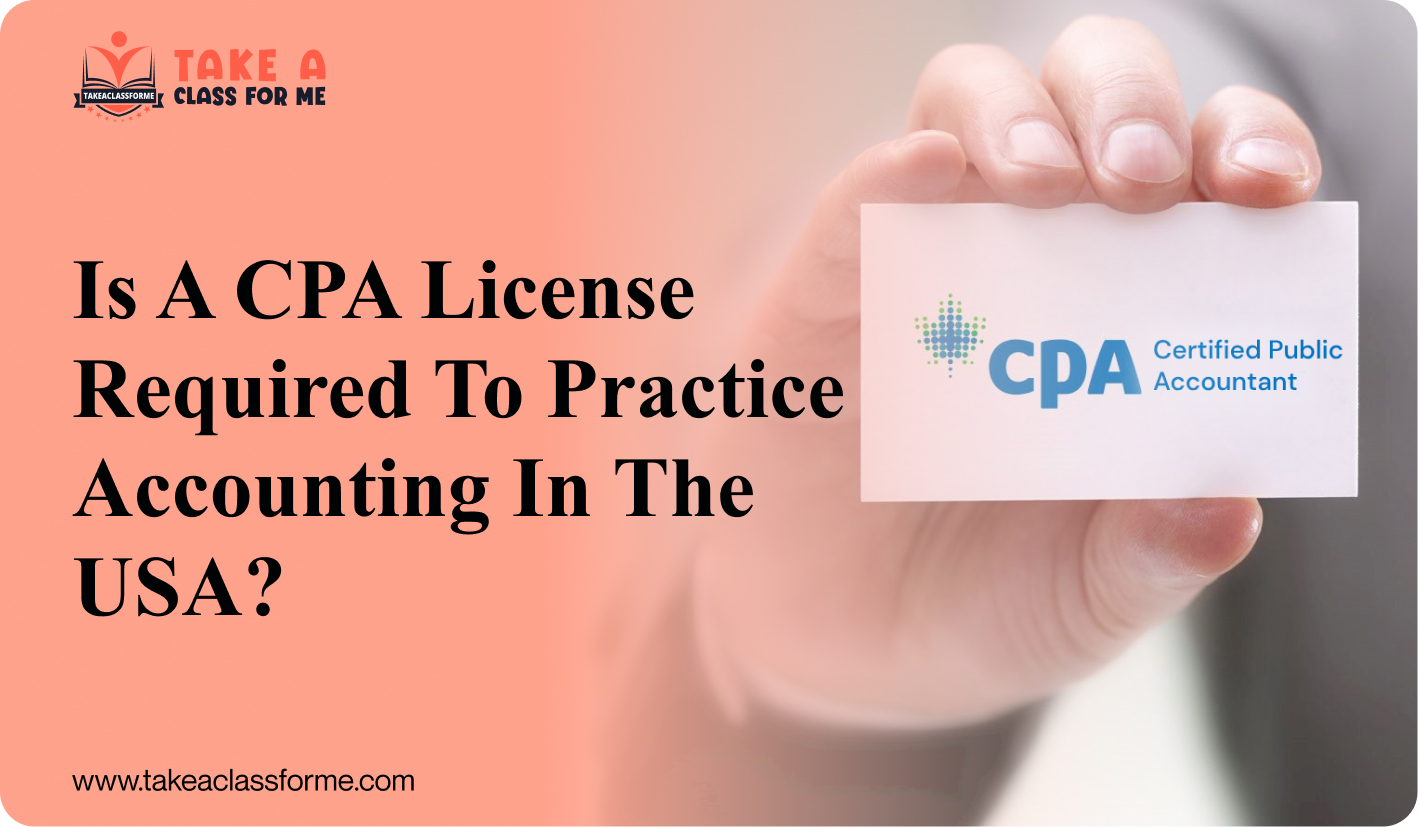
Do You Really Need a CPA License? Debunking the Myths
When people usually think about accounting, they assume that every accountant is a CPA. Now this is where the lines start to blur. While all CPAs are accountants, not all accountants are CPAs.
But, Is a CPA license required to practice accounting in the USA? People believe that a CPA license is an absolute must to prosper in the field, but it is a far cry from reality.
The plain truth is that you don’t really need a CPA license to thrive in accounting. There are plenty of roles that don’t require you to have the prestigious CPA license. Understanding when you do and don’t need a CPA license is a fundamental requirement for anyone in the field of accounting and that’s what we are just about to explore.
What is a CPA License and Why Does It Matter?
The CPA, also known as a Certified Public Accountant, is a highly regarded accreditation in the field of accounting, which shows a deep level of expertise and commitment to the field. A CPA license is a certificate awarded to accountants for having passed the rigorous CPA examinations.
If the accounting world was a game of chess, having a CPA license is like having the queen on your side. It is a badge of honor that screams “ I am not just an accountant, I am an experienced certified professional!”. It is acknowledged nationwide and opens doors to some high-level accounting roles.
Its role in the accounting industry
- It confirms that the receiver has a complete understanding of the accounting principles and practices.
- There are plenty of perks for accountants with a CPA license; only CPAs can perform public company audits, represent clients before the IRS, and many more.
- It maintains a sort of trust as a CPA license is a mark of excellence.
Governing Bodies
A CPA license is regulated by the following government bodies;
- American Institute of CPAs (AICPA): The AICPA is the national government body for CPA in the United States that maintains standards, and auditing procedures and handles CPA examinations.
- State Boards of Accountancy: Every US state has its own board for issuing CPA licenses. These boards are responsible for maintaining the CPA requirements in the USA.
Is a CPA License Required to Practice Accounting in the USA?
Let’s get straight to the point, A CPA license is not a one-size-fits-all ticket for every accounting job out there but it does empower you to have some extremely important accounting roles. Consider accounting as a wide landscape, while a CPA license is not required to explore every part of it, it does provide you with the key to visit the most high-stakes areas.
When Is a CPA License Essential?
- Auditing Financial Statements:
A CPA license is important for high-level jobs like auditing the financial statements of a company. Only a CPA can sign off on these reports.
- Filing Reports with the SEC:
CPAs are the trusted referees in the high-stakes game of filing reports with the SEC (Securities and Exchange Commission). For publicly traded companies, the SEC demands high-end professionals like certified CPAs for accurate financial reporting.
- Providing Expert Tax Advice:
CPAs bring their experience and knowledge to the table when dealing with tax situations for high-net-worth individuals or companies. They are responsible for maintaining tax codes, preparing tax returns, and representing clients before the IRS.
Differences Between CPA and Non-CPA Accounting Roles
Accounting is a grand theatrical performance, where some roles are just more important than others. Some are the leading actors and some work behind the scenes. Here, CPAs are the leading actors having the necessary credentials while non-CPAs are the supporting actors.
Let’s look at some differences in CPA vs. non-CPA careers;
CPA Roles
Scope of Responsibilities:
- Auditing and Assurance: CPAs are the experts who deal with the auditing within a company and look after matters such as financial reports and adherence to regulatory standards.
- Tax Advisory: With the reservoir of information they hold, they are equipped with the necessary knowledge to handle complex tax issues.
- Regulatory Filings: CPAs maintain the regulatory findings for any publicly traded company.
Credentialing and Regulation:
- Certification: Accountants have to stick to the strict code of ethics to pass the CPA exam and get the license.
- Regulation: CPAs are required to undergo ongoing professional education to enhance their credibility and authority.
Career Path and Opportunities:
- Career Advancement: A CPA license is a treasure trove of opportunities. A CPA accountant has access to senior-level positions and he can even open up his own firm.
- Higher Earning Potential: Due to the nationwide acceptance of a CPA license, these roles usually offer higher salaries than non-CPA roles.
Non-CPA Roles
Scope of Responsibilities:
- Bookkeeping: Bookkeeping doesn’t require a CPA license as it deals with maintaining financial records and tracking day-to-day transactions.
- Accounts Payable/Receivable: The role involves handling payments and collections for businesses and doesn’t require a CPA license either.
- Payroll Specialist: These accountants ensure that employees are paid on time and the job doesn’t necessitate a CPA license.
Credentialing and Regulation:
- Certification: Non-CPA accounting roles do not require a CPA license. These roles may require some specialized training or courses to perform these functions.
- Regulation: Accounting without a CPA license is not strictly scrutinized by the regulatory bodies which is why non-CPA individuals only have to worry about the industry standards and company policies.
Career Path and Opportunities:
- Career Progression: Non-CPAs can surely climb the ladder in their roles but moving to higher positions can prove to be difficult without a certification.
- Earning Potential: Their salaries are not as competitive as those with CPA licenses and they have fewer advancement opportunities too.
Advantages of Becoming a CPA
Increased Job Opportunities
A CPA license is a golden ticket to thousands of job opportunities that are usually unavailable to non-CPAs. No matter what position you are eying, from public accounting firms and corporate finance departments to government agencies, a CPA license will help you find a senior-level position in no time. Employers value the vast amount of knowledge CPA professionals have regarding accounting principles.
Higher Earning Potential
One of the most immediate and tangible benefits of a CPA certification is its ability to increase earning potential. An accountant with a CPA license is more likely to get paid higher than a non-CPA accountant. This is because of the specialized training and expertise that come as a package with a CPA certification. It is estimated that CPAs earn at least 10-15% more than non-CPAs.
Credibility in the Field
As a globally considered certification, a CPA license boosts your credibility to another level. Friends, employers, and peers all view CPA-certified professionals as trustworthy.
When considering a public accountant vs CPA, the distinction always lies in the credibility of both, as CPAs are recognized for their advanced knowledge and expertise in the field.
Long-Term Career Growth
A CPA license is a long-term investment for your career. It is common for CPAs to climb up the ladder faster than non-CPAs and move to executive and leadership roles. They can even become partners in the firms.
Flexibility to Offer Specialized Services
CPAs have the flexibility to offer a range of specialized services, including auditing, tax preparation, financial advising, and consulting. This diversity allows them to work in almost all areas of accounting including auditing, finance, forensic accounting, and many others. This gives them job security and paves the way for a dynamic career experience.
Steps to Become a CPA in the USA
Here are the detailed guidelines you can follow to become a certified CPA;
Educational Requirements
First things first, you need to check whether or not you are meeting the educational requirements of CPA job eligibility criteria. It is mandatory in most states to complete at least 150 credit hours of college coursework. This usually includes;
- Securing a bachelor’s degree in accounting or any related field such as finance or business. A bachelor’s degree is of 120 semester hours.
- You need to complete an extra 30 semester hours in accounting, business, or any related coursework. This is done to complete the license requirement of 150 semester hours.
CPA Examination
This might be the most difficult part for many candidates because now you have to pass the CPA examinations. A CPA exam typically consists of four parts;
- Auditing and Attestation (AUD)
- Business Environment and Concepts (BEC)
- Financial Accounting and Reporting (FAR)
- Regulation (REG)
Each section is 4 hours long making 16 hours in total. Candidates can attempt each section separately but within 18 months. Failure to do so will result in the expiration of the given section.
Experience Requirements
In addition to the mentioned requirements, candidates must meet other CPA requirements in the USA such as experience requirements stated below;
- They need a minimum of 1 to 2 years of experience under a certified CPA.
- Some states may make it compulsory to submit documents such as employer letters or affidavits to prove your experience.
Conclusion
Becoming a CPA isn’t just about dealing with numbers but it’s about unlocking a bright career. From the complex requirements of 150 credit hours to taking the CPA exam, every step brings you closer to an elite level of expertise.
But before diving in, ask yourself. Where do you want your career to go? If you are ready for a challenging and rewarding journey then buckle up, because this is just the thing for you.
What! Did we hear it right? Are you struggling to understand the requirements and fear you might not get the online accounting exam right on the first go? Secretly wishing Can I Pay someone to take my online accounting exam?
Here’s the good news. With Take A Class For Me, you can hire an expert who will take your online accounting exam for you and bring the required results in the first go. Why fear the exam when you have us on your side? Sign up now!
Expert Assignment Writer
Hi everyone! Hello there, My name is Emily, and I provide Online Class Helper services in Los Angeles. Who says balancing between work or school by meeting and final tasks, and having a busy social life? I discovered “Take A Class For Me” when I couldn’t effectively manage the rigors of an online business management class. They were so helpful with our online class whether it be with tutorials or assignment submissions. I can now devote time and energy to a job, but I do not have to sacrifice academic performance for it.






